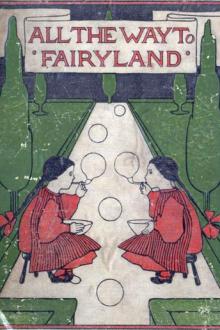A Woman's War by Warwick Deeping (top romance novels txt) 📕

- Author: Warwick Deeping
- Performer: -
Book online «A Woman's War by Warwick Deeping (top romance novels txt) 📕». Author Warwick Deeping
Mrs. Bains was a woman with a sanguine temper, a
temper that made her an aggressive enemy, but a very
loyal and active friend. Her black eyes twinkled with
motherly concern as she watched Murchison pull off his
gloves and stuff them into his hat.
“They tell me that I have been working too hard,” he
said, with a smile.
“Lor’, sir, you do work; you don’t do your cooking with
no pepper. I was taking it to myself, sir, the power of
worry we’ve give you over the child.”
“A good fight is worth winning, Mrs. Bains. I am
proud of the victory.”
“And I reckon none else would ‘a’ done it, and so says
the neighbors. Will you step up-stairs, sir? Don’t mind
my man, he’s just scrubbing the soot off ‘im.”
A pair of huge fore-arms, a gray flannel shirt, and a red
face covered with soap-suds saluted Murchison from the
steaming copper in the scullery.
“Goodmornin’, sir; ‘ope you’re well.”
“Better, Bains, thanks. Washing the war-paint off,
eh?”
“That’s it, sir,” and the sweep grinned good-will and
sturdy admiration; “the kid’s doing fine, I hear.”
“Could not be better, Bains.”
“I reckon you’ve done us a rare good turn, sir.”
Murchison’s eyes smiled at the man’s words.
“I’m glad we won,” he said; “a child’s life is worth
fighting for.”
“It be, sir, it be,” and the sweep swished the soap-suds
from his face till it shone like the sun brightening from
behind a cloud.
Murchison climbed the stairs to the front bedroom, a
room liberally decorated with cheap china and colored
texts. The patient, a little girl, christened Pretoria by
her patriotic parents, lay on the bed beneath the window.
The satiny whiteness of the child’s skin contrasted with
the cherry-pink night-gown that she wore. It had been
a case of diphtheria, a case that would probably have
ended in disaster before the days of serum. Murchison
had sat up half one night, doubtful whether he would not
have to tracheotomize the child.
“Hallo, Babs, how’s that naughty throat?”
He sat down on the edge of the bed and chatted boyishly to Pretoria, whose shy eyes surveyed him with a
species of delighted adoration. The hero worship that
children give to men is pathetic in its ideal trustfulness.
“I’m better, thank you, sir.”
“That’s right; you are beginning to know all about it,
eh? Tongue fine and red. She’ll be a talker, Mrs. Bains.
Taking her milk well, yes. Keep her lying down.”
Mrs. Bains’s big, red hands were fidgeting under her
white apron.
“Begging your pardon, doctor, but the child’s been
a-bothering me since you called last, to know whether
she mayn’t give you some flowers.”
Mrs. Bains reached across the bed to where a cheap
mug on the windowsill held a posy of pink daisies.
“They’re just common things,” said the sweep’s wife,
with an apologetic smile.
The child’s hand went out, and there was a slight
quivering of the bloodless lips.
“For the doctor, with Pretoria’s love.”
Murchison took the flowers tenderly in his strong, deft
hand.
“Who’s spoiling me, I should like to know? Aren’t
they beauties? Supposing I put two in my button-hole?
Thank you, little one,” and he bent and kissed the child’s
forehead.
“You won’t drop ‘em in the street, sir?”
The pathetic touch of unconscious cynicism went to
the man’s heart.
“What, lose my flowers! You wait, miss, to see
whether I don’t wear some of them tomorrow.”
The little white face beamed.
“You’re that kind to humor the kid, sir,” quoth Mrs.
Bains, with feeling, as she followed Murchison down the
stairs.
An hour later Mr. William Bains was hanging his clean
face over the garden fence as an example to the neighbors, when a smart victoria stopped at the upper end of
Mill Lane. A dapper gentleman sprang out, and came
quickly down the footway as though the reek of the tannery disgusted his polite nostrils. He glanced right and
left with stiff-necked dissatisfaction, his sleek, fashionable
figure reminding one of some aristocratic fragment of
Sheraton plumped down amid battered oddments in some
dealer’s shop.
Mr. William Bains scanned him, and grunted, noting
the effeminate sag of the shoulders and the glint of the
patent-leather boots. There was a certain insolent gentility in the dapper figure that made the man of the brawny
fore-arms feel an instinctive and workmanlike contempt.
“Can you inform me where a Mrs. Randle lives?”
The sweep caught the white of Dr. Steel’s left eye, and
jerked his pipe-stem laconically at the next cottage down
the lane.
“No. 10.”
“Obliged,” and Parker Steel passed on.
Five minutes later the door of No. 10 Prospect Row
was clapped snappishly on the doctor’s heels. It opened
again when the smart physician had regained his carriage and driven off. A thin woman, with an old cloth
cap perched on her mud-colored hair, came out bareelbowed. Her face warned Mr. Bains of the fact that she
was the possessor of a grievance.
“See the gent come along?”
The sweep nodded.
“Sort of kid-gloved gentleman that makes a respectable
woman think of this ‘ere charity as an insult. Mrs.
Gibbins sent him to see my Tom. I’m thinking she
might as well mind ‘er business.”
Mr. Bains cocked his pipe and chuckled.
“Dr. Steel’s one of the smart ‘uns,” he said.
“Toff! I’d like to give ‘im toffee! Comes into my
‘ouse with ‘is ‘at on, and looks round ‘im as though ‘e
was afraid to touch the floor with ‘is boots. Sh’ld ‘ear
‘im talk, just as though ‘is voice ‘adn’t any stomach in it.
I told ‘im we had Murchison, Mrs. Gibbins or no Mrs.
Gibbins. ‘E looked me over as though I was a savage,
and said, ‘Haw, yes, Dr. Murchison ‘as all the parish
cases, I believe.’ ‘And a good job, sir,’ says I. Lor’,
I wouldn’t as much as scrub ‘is dirty linen.”
Mr. Bains fingered his chin and sucked peacefully at
his pipe.
“I likes brawn in a man,” he said, “and a big voice,
and a bit of spark in th’ eye.”
“Don’t give me any of yer ‘trousers stretchers’ or yer
fancy weskits Murchison’s my man.”
“Grit, blessed grit to the bone of ‘im.”
“And a real gentleman. Takes ‘is ‘at off in a ‘ouse.
T’other chap ‘ain’t no manners.”
It is a cheap age, and cheap sentiment satisfies the
masses, a mere matter of melodrama in which the villain
is hissed and the “stage child” applauded when she
points to heaven and invokes “Gawd” through her cockney nose. Sentiment in the more delicate phases may
be either the refinement of hypocrisy or the shining out
of the godliness in man. The trivial incidents of life may
betray the true character more finely than the throes of
a moral crisis. The average male might have dropped
Miss Pretoria’s flowers round the nearest corner, or
thrown them into his study grate to wither amid cigar
ends and burned matches. James Murchison kept the
flowers and gave them to his wife.
“Put them in water, dear, for me.”
“From a lady, sir?” and Catherine’s eyes searched the
lines upon his face. She was jealous for his health, but
her eyes were smiling. Dearest of all virtues in a woman
are a brave cheerfulness and a tactful tongue.
Her husband kissed her, and it was a lover’s kiss.
“A thank-offering, dear, from the Bains child.”
“How sweet! Somehow I always treasure a child’s
gift; it seems so fresh and real.”
“Poor little beggar,” and he smiled as he spoke. “I
wouldn’t have lost that life, Kate, for a very great deal.
It was something to feel that fellow Bains’s hand-grip
when I told him we had won.”
Catherine was settling the flowers in a glass bowl.
“It was just a bit of life, dear,” she said.
“Yes, it is life that tells. I think I would rather have
saved that child, Kate, than have written the most brilliant book.”
She turned to him and put her arms about his neck.
“That is the true man in you,” and her eyes honored
him.
“You dear one.”
“Kiss me,”
Marriage had been no problem play for these two.
Catherine lay thinking that night, with her hair in
tawny waves upon the pillow, waiting for her husband
to come to bed. She was happier and less troubled at
heart than she had been for many weeks. The strain had
lessened for her husband with the summer, and he seemed
his more breezy, strenuous self, a great child with his
children, a man who appeared to have no dark corners
in the house of life. Wilful optimist that she was, she
could not conceive it possible that a mere “inherited lust”
could bear down the man whose strength and honor were
bound up for her in her religion. Where great love exists,
great faith lives also. Catherine was too ready, perhaps,
to forget her fears, to regard them as mere thunder-clouds,
black for the hour, but destitute of heavier dread. She
ascribed his momentary weakness to the brain strain of
the winter’s work. The words that had terrified her in
Porteus Carmagee’s garden had proved but a fantasy,
for a trick of the heart had explained the incident and
given the denial to Mrs. Betty’s insinuations. The
ordeal need never be repeated, so she told herself. Murchison could be saved from overwork. The assistant he
had engaged was a youngster of tact and education.
Love will stand trustfully through the storm, under a
tree, braving the lightning; nor had Catherine realized
how vivid his own frailty appeared to the man she loved.
He was sitting alone in his study while she comforted herself with dreams in the room above, his head between his
hands, his heart heavy in him for the moment. An inherited habit is never to be despised. The gods of old
were prone to mortal weakness in the flesh, and no man
is so masterful that he can command his own destiny unshaken. We are what the world and our ancestors have
made us. The individual hand is there to hold the tiller,
but even a Ulysses must meet the storm.
Murchison turned his tired face towards the light,
heaved back his shoulders, and sighed like a man in pain.
He rose, put out the lamp, locked the study door, and
taking his candle went up to his dressing-room that looked
out on the garden. The blind was up, the window open,
the darkness of space afire with many stars. He stood
awhile at the open window in deep thought, letting the
night breeze play upon his face. He was glad of his
home life, glad that a woman’s arms were waiting for
him, ready to shelter him from himself. He thanked
God, as a strong man thanks God, for blessings given.
The breath of his home was sweet to him, its life full of
tenderness and good.
His wife’s bedroom had an air of delicacy and refinement with its cherished antique furniture, its linen curtains flowered with red, the paper and carpet a rich green.
Candles in brass sticks were burning on the dressingtable, where a silver toilet-set brushes, mirror, combs,
and pin-boxes recalled to the wife her marriage day.
There were books red, green, and white on a copperbound book-shelf over the mantel-piece. The room suggested that those who slept in it had kept the romance of
life untarnished and unbedraggled. There was no slovenly realism to hint at apathy or





Comments (0)